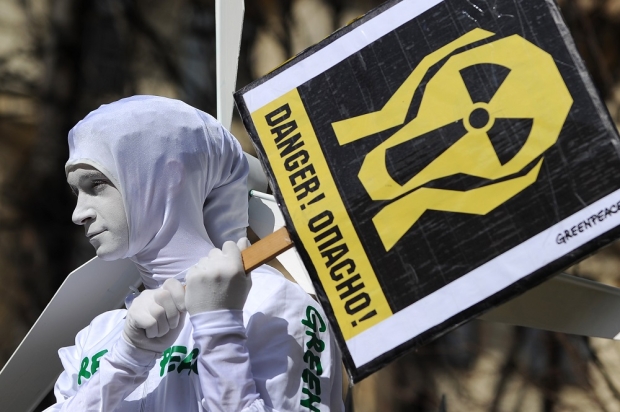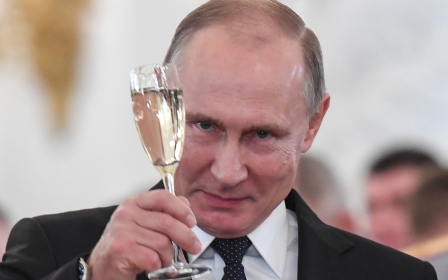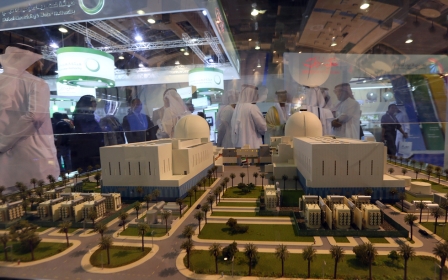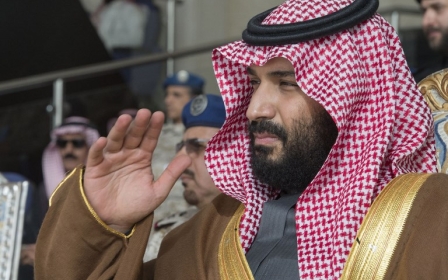Turkey embarks on nuclear future with Russian help
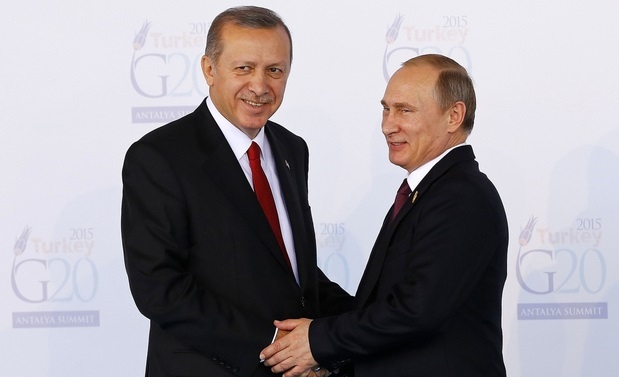
ISTANBUL, Turkey – Turkey officially began work on the construction of its first nuclear power station on Tuesday in conjunction with Russia, with officials saying it was the only feasible long-term option to meet energy demand, brushing away concerns as unfounded.
Turkish officials have said they expect the first of four reactors at the Akkuyu nuclear power station on the country's Mediterranean coast to go online by 2023, when the modern Republic of Turkey will mark its centenary.
The $20bn project will be financed and built by Russia's state-owned Rosatom, one of the biggest international projects undertaken by the Russian nuclear energy firm.
Russia's president, Vladimir Putin, arrived in Ankara on Tuesday, his first foreign trip since his re-election in March, at the invitation of his Turkish counterpart Recep Tayyip Erdogan.
This is a historic moment and I am pleased to be able to have my friend Putin here with me
- Recep Tayyip Erdogan
Putin and Erdogan connected to the ground-breaking ceremony in Mersin province via video link, lauding the project as another symbol of Turkish-Russian cooperation.
Erdogan called the project a dream come true and a symbol of the state of Turkish-Russian relations.
"This is a historic moment and I am pleased to be able to have my friend Putin here with me for this moment. As part of our energy security policy we will continue to invest in the field and nuclear energy has a significant role to play in this," said Erdogan.
He said Turkish-Russian ties had come a long way in the last 15 years and major deals like the purchase of the S-400 missile defence system, the Turkstream pipeline and the Akkuyu power plant symbolised the strides in the relationship.
Putin, in his address, said Russia was pleased to help Turkey embark on its quest for nuclear energy.
"Turkey is a country with an advanced economy but this [nuclear energy] is a new and big step forward and Russia as a leader in this field is happy to help Turkey,” said Putin. “We are also pleased to have 220 Turkish students at our universities, which lead in the field of nuclear energy."
Putin also thanked Turkey for bestowing strategic investment status on the project and said it would boost the economies of both countries.
Putin is also expected to discuss developments and future moves in Syria with Erdogan.
Iran's president, Hassan Rouhani, whose country has collided with the international community over its own nuclear ambitions which it insists are peaceful, will join Erdogan and Putin for talks in Ankara on Wednesday.
Turkey has been eyeing nuclear energy as an option since the late 50s, but consecutive bids were cancelled over the decades for various reasons.
Turkey officially embarked on the road to build the Akkuyu nuclear energy station in 2010. Upon completion, it is expected to have four reactors capable of generating 4,800mw per-hour combined, and to meet six to seven percent of Turkey's energy needs at current estimates.
The project, however, has been beset by various problems in the past eight years.
A deep crisis in relations between Ankara and Moscow put the entire project in jeopardy after Turkey shot down a Russian fighter jet near the Syrian border in November 2015.
In 2017, Rosatom looked to sell 49 percent of its stake in Akkuyu as it was engulfed in a financial crisis.
Critics of Ankara's focus on nuclear power to meet the energy-hungry country's needs have questioned the wisdom of building nuclear power stations in earthquake-prone Turkey, as well as the potential environmental impact.
The nuclear disaster in Japan's Fukushima in the wake of an earthquake and tsunami in 2011 has often been cited as a warning against nuclear facilities in earthquake-prone areas.
Critics have also questioned the use of what they call unreliable Russian technology.
Turkish officials have brushed aside concerns, insisting that the most sophisticated technology will be used in Akkuyu and that many studies have shown the site to be away from major faultlines in a relatively low-risk earthquake zone.
Turkish officials have said nuclear power is the only option for Turkey to meet its growing energy demand and to maintain competitive economic growth rates.
Most cities and villages in Turkey suffer periodic power outages caused by climatic conditions, distribution problems, or the grid's inability to meet demand.
Aziz Sancar, the US-based Turkish scientist who won the Nobel prize in chemistry in 2015, endorsed Turkey's venture into nuclear energy generation in a public service message broadcast on Monday by the energy ministry.
Turkish officials are looking to emulate South Korea, which built its own station after 35 years of imported nuclear energy.
The energy minister, Berat Albayrak, who is also Erdogan's son-in-law, called the start of work on Akkuyu the realisation of a 60-year-old nuclear dream and a move to a different league in terms of energy diversity and independence.
“God willing with this ground-breaking ceremony Turkey will take one step towards having nuclear power in its goal of a 'strong and big Turkey',” Turkish newspaper Haberturk quoted him as saying.
The Akkuyu nuclear station deal was concluded under the "build-own-operate model", through which Rosatom has been granted a 49-year licence to sell electricity generated at the facility.
Rosatom will be paid a non-inflation-adjusted 12.35 US cents per kilowatt-hour for the first 15 years of operations.
Rosatom has said the build-own-operate method is the company's standard operating model for developing countries, where the firm is paid for electricity generated rather than for selling a facility.
Middle East Eye propose une couverture et une analyse indépendantes et incomparables du Moyen-Orient, de l’Afrique du Nord et d’autres régions du monde. Pour en savoir plus sur la reprise de ce contenu et les frais qui s’appliquent, veuillez remplir ce formulaire [en anglais]. Pour en savoir plus sur MEE, cliquez ici [en anglais].


